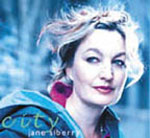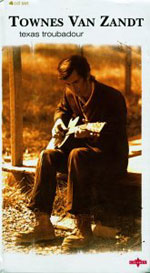Troubadours and Dronemasters
| |

| Although I still occasionally get free books and CDs to review, it's been a while since I got a full press pack delivered like the one accompanying Jane Siberry's City CD: calendar, postcards, poster, tour book and the usual info and review sheets. All very nicely done [thank you!], as befits a small artist-run record company like Sheeba Records [www.janesiberry.com] - for Siberry, like Ani Di Franco and Rickie Lee Jones [to name but two others] long ago abandoned [or was abandoned by] the majors and does very well thank you putting out her own work with total artistic control. In addition to her 'normal' albums, recent projects have included books, an experimental collage album from New York, and a covers album of spirituals. City is a gathering of Siberry's collaborative work throughout the 90s and contains both the best and worst of her work. Very little of it comes close to her 1980s quirky pop trilogy The Speckless Sky, The Walking and Bound By The Beauty, or even more recent albums like Maria or the partially Eno-produced When I Was A Boy. Much of it sounds like the sort of well-meant, overproduced, uptight music which makes you want to shake the artist and say 'loosen up', for something has gone, mostly the strange and haunting hooks along with the quirky originality that used to mark out her songwriting; or maybe the rest of the world just caught up. But take, for example, the opening track 'My Mother Is Not The White Dove': interesting title, but the music is typical Real World collaboration, semi-celtic swirls, african-type backbeat, drones and mournful singing. Peter Gabriel has a lot to answer for! This is eclecticism for its own sake and nothing more, a 'world-music' collaboration that dilutes rather than enhances or enpowers; musicians jamming in a room, desperate to produce something to put out on CD and prove their musical openness and worthiness. Other tracks are more haunting, such as the collaboration with ex-SPK musician Graeme Revell, now writing mainstream film scores, and Siberry's work with the genius that is Hector Zazou. To be honest it seems the tracks are better where there is an individual guiding vision: Zazou's geographical concept [Songs from the Cold Seas], Revell's ideas of how The Crow should be scored; or even in Siberry's very individual contribution to a Laura Nyro tribute album, where she creates a strange slippery medley of Nyro's work; or her vocal for Joe Jackson's Heaven and Hell concept album. Elsewhere I'm intrigued but not won over by Siberry's Judee Sill cover [check out the original Sill albums, recently reissued on CD for a weird and individual hippy take on spirituality, love and feminism], bemused that the one-minute contribution to Morgan Fisher's project Miniatures 2 has been pulled out of context [the original Cherry Red CD of the project is superb], and sort-of like the remake of 'Calling All Angels' from Wim Wender's Until the End of the World. The other track from a Wenders project, 'Slow Tango' is also a winner, but elsewhere the songs from Barney's Great Adventure - The Movie and a collaboration with saddo has-been Nigel Kennedy are merely embarrassing. I think there's a real conceptual flaw pulling these tracks together instead of leaving them scattered throughout the musical universe; they simply don't make a coherent album, however hard I try, as listener, to make them into that. As it is, City is an interesting hotchpotch of musical moments from the last decade. Me, I'm still waiting for the great follow-up to Bound By The Beauty... |

| Singer-songwriter Peter Case has also felt the need to gather up, and in this case re-invent, some of his older music. On Thank You St. Jude [Travellin' Light] he and David Perales on violin take the best of Case's first two albums and a couple of new songs and turns them into country-folk rather than folk-rock. The violin swoops and curls around Case's smokey vocals, downhome guitar and Dylanesque harmonica, all of the songs seduce and charm. They managed to not play 'Horse and Crow', my own favourite, and I always wonder about revisiting studio productions, but Peter Case is a neglected genius who you should all listen to more, and this is as good a place as any to start. Meanwhile in New York City, Marc Ribot totally dismembers and re-assembles the music on Saints! On this engaging and deliberately unfocussed album, he plays Albert Ayler, Lennon & McCartney, Leonard Bernstein, gospel tunes, as well as new music by John Zorn, John Lurie and himself. Eclectic, quirky, electric and original, Ribot retains the spirit of each piece yet comes at it from odd angles, charging in before retreating, only to re-assess before re-approaching and re-invigorating each and every piece here. Re-markable! Massacre are part of, or certainly at one time were part of, the New York downtown music scene, and their new live album meltdown has been put out by John Zorn's Tzadik label. However, it was recorded at the Queen Elizabeth Hall, London in June 2001 as part of the Robert Wyatt curated Meltdown Festival; and very glorious stuff it is, too. Fred Frith on guitar, Bill Laswell on bass, and the brilliant Charles Hayward on drums stir up a storm of improvised jazz-punk-funk that swirls, bubbles, burbles and clatters along over eclectic and intriguing rhythms. Interestingly enough, at times I'm reminded of the more experimental end of prog-rock [regular Tangents readers will probably know I don't mean this as a criticism], particularly on 'up for it', the opening track on the CD, which is particularly fluid and inventive. The whole CD is astonishing, and proves that Laswell still has interesting music in him when he stops churning out funk/dub/hip-hop collaborations like Points of Order [inner-rhythmic], about which the less said the better. Back in time, in NYC, John Cale hung out and helped create the Velvet Underground. Like Robin Tomens I find the interesting Velvet Underground the bootlegged improvisors and noise-merchants, not the jangley drone-pop of the official albums; I also love the recently released trilogy of John Cale's early experiments with noise: Sun Blindness Music, Dream Interpretation and Stainless Gamelan [Table of the Elements]. On offer here are improvised takes for solo viola, Vox Continental organ, viola/violin duets, electronic sounds, guitar solos and proto-gamelan drone/chiming pieces. If you like drones and early minimalism, eclectic, playful music, you'll like these as much as I do; they sit particularly well alongside the recently issued Velvets box set - and perhaps even better alongside what I hope may finally see the light of day, namely early classic live Velvets instead of the later Cale-less, Lou Reed-dominated version of the band. |

| And finally, what's really been hogging the CD player this month is my Christmas present to my self, Townes Van Zandt - Texas Troubadour, a 4-CD set on Charly Records, which pulls together the seven studio albums he made between 1968 and 78 along with a smattering of the live songs on Live at The Old Quarter, Houston Texas, an album I already own. It's amazing stuff, though I confess I'm one of those strange people who prefers the cracked, near-ruined voice [smoking and drinking, sine you ask] of later Van Zandt, and enjoy the endless live albums of his later years. In fact I also recently purchased a limited edition live CD, Live at McCabe's, which Glitterhouse have just put out. But back to business. Texas Troubadour is perhaps more country than later incarnations of Van Zandt might suggest, and pre rugged ruin, Van Zandt was clearly a good-looking charmer - you can almost see the original record labels just knowing he would be a seller. But the music is what counts, and over seven albums the work just gets better and better, quirkier, more memorable and inidividual. It's a wonder hearing studio band versions of classics like 'For the Sake of the Song' or a speedy run through 'You Are Not Needed Now', which I only knew as a gorgeous funereal dirge. Disc 3 of the four is my favourite, containing High, Low and In Between and The Late Great Townes Van Zandt, both of which really sparkle with good music, tho I can do without a couple of honky-tonk numbers later on into the CD. But like all the best albums, whatever the style or studio production, whoever is accompanying, soloing, or backing Van Zandt here, the songs themselves shine through, are the real stars, as is the full mellow voice of their author. The box blurb isn't wrong when it claims van Zandt as 'a troubled genius and one of America's finest songwriters'. If you fancy doing some musical archeology, this big box is the place to start. © Rupert Loydell 2001 |